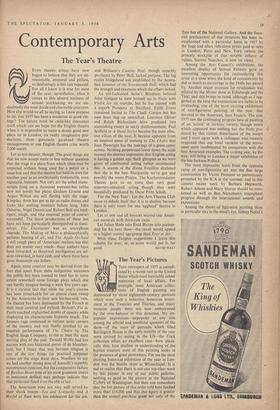Contemporary Arts
The Year's Theatre
EVEN theatre critics have now begun to believe that they are un- reasonable, immoral and pitiless, so deafeningly is this tale repeated. For all I know it is true for most of the year; nevertheless, when it comes to this absurd business of annual stocktaking we are un- doubtedly the most docile and charitable creatures. How else would we all be saying, as I now propose to do, that 1957 has been a moderate to good vin- tage? The nature must be child-like innocence itself which can see hope for the English theatre when it is impossible to name a dozen good new plays on in London, six really imaginative pro- ductions, three genuinely go-ahead theatre managements or one English theatre critic worth 2,000 words.
Let us not despair, though. The great things are that we now accept more or less without question that the stage is a place from which ideas may be imparted without being used for a pulpit or a soap-box and that the theatre has held its own for another year as an intellectually fashionable, even reputable, business. Not only are the soiled manu- scripts lying on a thousand espresso-bar tables now not novels but plays; Graham Greene and Angus Wilson are still flirting with the stage, Kingsley Amis has got as far as radio drama and looks like making musicals before long, John Osborne, Nigel Dennis and Robert Bolt are intel- ligent, tough, and (the essential point of course) successful. The latest productions of these last have not been particularly distinguished in them- selves; The Entertainer was an amorphous charade, The Making of Moo a philosophically pathetic beating of air, and The Apple Orchard a still rough piece of 'American' realism, but that does not matter very much—these authors have been rewarded, as theatrical intelligences are sel- dom rewarded,,in hard Cash, and where three have gone thousands can follow.
Again, some comfort may be derived from the fact that apart from these indigenous successes the public has, been treated to (and has to some extent rewarded) some foreign plays which one can hardly imagine lasting a week five years ago. It is a curious fact that while the year's cinema has been remarkable for an almost clean sweep by the Americans in their new kitchen-sink vein, the theatre has been dominated by the French at their most cerebral and stylised. Beckett's Fin de Partie reached unplumbed depths of opacity while displaying his characteristic hypnotic touch. The Ionesco rage continued in various quiet corners of the country and was finally justified by an inspired performance of The Chairs by The English Stage Company, to me at least the most moving play of the year. Donald Wolfit had less success with two historical pieces of de Monther- lant, but 1 fancy that was because religion is one of the few things for practical purposes taboo on the stage these days. Needless to say we had another strong dose of Anouilh's superbly meretricious cynicism, but the comparative failure of Restless Heart (one of his most gruesome essays in innocence defiled) may perhaps indicate that that particular flood is on the ebb at last.
The Americans were not very well served by their shock troops—Tea and Sympathy and A Haifa! of Rain were too adolescent for the job, and Williams's Camino Real, though superbly produced by Peter Hall, lacked purpose. The big realist bridgehead was established by the Austra- lian Summer of the Seventeenth Doll, which had the strength and exactness which the others lacked.
An old-fashioned Actor's Blindness induced John Gielgud to mew himself up in Nude with Violin for six months, but he has atoned with a superb Prospero at Stratford. Edith Evans remained buried in The Chalk Garden but has now been dug up unscathed. Laurence Olivier and Ralph Richardson have produced two astonishing essays in seedy disillusionment; Paul Scofield in A Dead Secret became the most effec- tive villain of the year. It became apparent from an inspired piece of miming in The Chairs that Joan Plowright has the makings of a great comic actress. Nothing perpetrated lower down the scale marred the distinct impression that English acting is having a golden age. Such glimpses as we were given of continental acting rather accentuated this. A season of the divine Feuillere disclosed that she is the best Marguerite we've got and possibly the worst Phedre. The Kurfurstendamm Theater gave us no more than very good repertory-standard acting though they were beautifully produced by Oscar Fritz Schuh.
For the New Year : Let the Arts Theatre Club cease to delude itself that it is in decline because there is only room fOr one 'egghead' theatre in London.
Let us one and all boycott second-rate Ameri- can musicals with third-rate casts.
Let Julian Slade take Enid Blyton into partner- ship for his next show—the result would appeal to a higher mental age-group than Free as Air.
With these Delphic suggestions I leave this column for ever, or, as some would put it, for










































 Previous page
Previous page